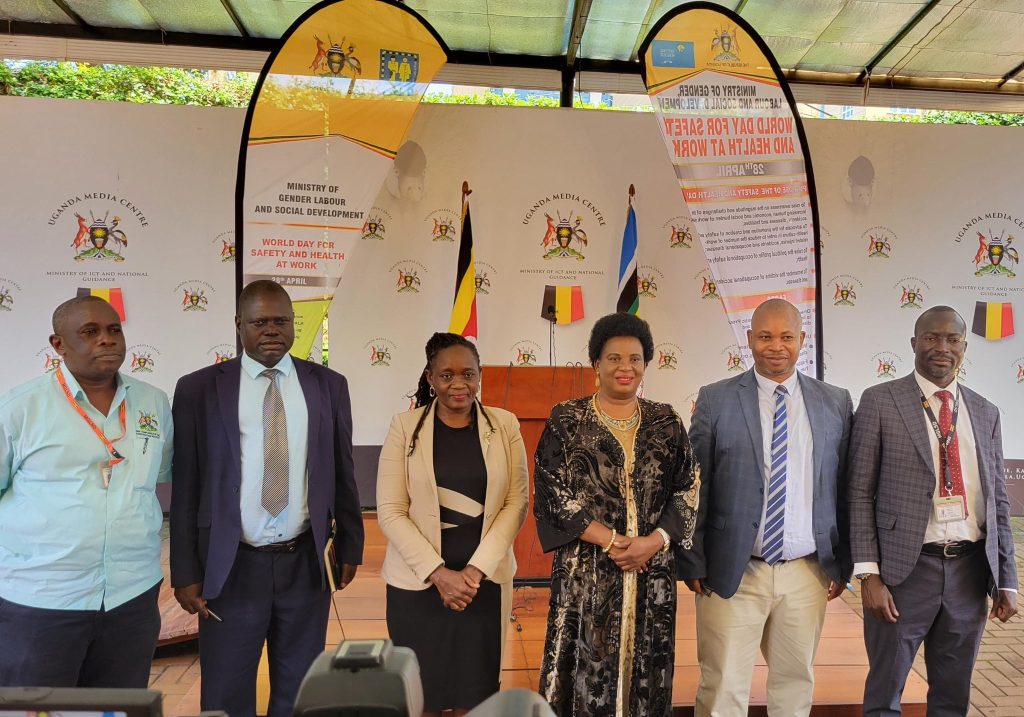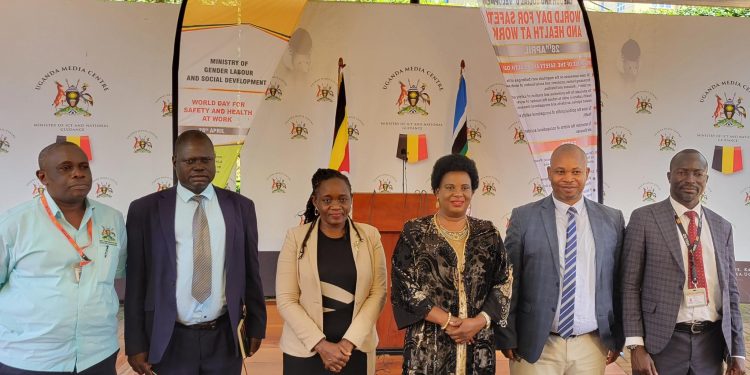
KAMPALA, Uganda – The Ministry of Labour, Gender and Social Development (MGLSD) will launch a digital platform to enhance workplace safety oversight nationwide during the World Day for Safety and Health at Work commemoration.
The national event, held at the Uganda Industrial Research Institute (UIRI) in Namanve, will feature the debut of the Occupational Safety and Health Management Information System (OSHMIS). This new digital tool aims to transform the monitoring, reporting, and enforcement of workplace safety standards across Uganda.
This year’s theme, “Revolutionizing Health and Safety: The Role of AI and Digitalization at Work,” highlights the increasing significance of technology in creating safer and more efficient work environments.
Minister of Gender, Labour and Social Development Amongi Betty Ongom said the OSHMIS platform is a crucial step toward modernizing Uganda’s occupational safety systems.
“The new OSHMIS platform will enable real-time tracking of workplace hazards, streamline the licensing process for workplaces, and improve monitoring of compliance with Occupational Safety and Health (OSH) standards across the country,” Amongi stated.
She emphasized the shared responsibility of all stakeholders in maintaining safe and healthy workplaces.
“This annual commemoration serves as a vital reminder of our collective responsibility to ensure that every worker is safe, healthy, and their well-being protected at the workplace,” she noted.
Amongi added, “Employers must establish safe work procedures, maintain a clean and organized environment, and provide adequate training on occupational safety and health (OSH).”
She further called for proactive risk management and stronger employer-employee collaboration.
“Proper handling of hazardous materials, availability of protective gear, and well-defined emergency plans are crucial in reducing workplace accidents,” she said. “We are seeing an alarming rise in workplace incidents from factory injuries to building collapses. Many of these are preventable if employers adhere to basic OSH standards.”
The OSHMIS system is expected to significantly improve enforcement by allowing the ministry to digitize safety reporting, workplace registration, and streamline inspections.
Amongi also highlighted the potential of Artificial Intelligence in enhancing workplace safety.
“AI-driven systems can analyze real-time data to predict hazards before they escalate into tragedies,” she said, while also urging caution regarding over-reliance on digital tools. “Employers should implement strong cybersecurity safeguards to protect sensitive worker information and ensure operational safety.”
She also addressed the mental health implications of the digital age.
“We must address ‘techno-stress,’ information overload, and the blurring of work-life boundaries caused by constant digital connectivity. Employers should promote mental well-being and consider ‘digital detox’ periods,” she advised.
In a significant development, Amongi announced that President Museveni has assented to the amended Occupational Safety and Health Act. This empowers enforcement teams to assess all workplace categories and penalize non-compliant employers.
“These new provisions will empower our teams to assess all workplace categories and take action against non-compliant employers,” she said.
Despite progress, challenges such as insufficient health insurance, poor compensation practices, and weak enforcement of safety laws persist. Amongi affirmed the ministry is intensifying local-level inspections and has approved new inspection and whistleblower guidelines.
“We have approved guidelines for inspections and whistleblowing. We are intensifying inspections, especially at the local government level, to ensure swift action against safety violations,” she added.
Assistant Commissioner for Occupational Safety and Health Eva Katushabe described OSHMIS as a powerful online tool for reporting hazards, tracking incidents, and licensing workplaces.
“With this system, inspections and monitoring will be intensified to strengthen enforcement,” Katushabe stated.
Echoing the commemoration’s theme, Eng. Chris Opuch from the ministry noted the transformative impact of AI and digital tools on the organization and monitoring of work.
“This year’s theme, ‘Revolutionizing Health and Safety: The Role of AI and Digitalization at Work,’ reflects on how AI and digital tools are reshaping the world of work and aims to align innovation with sustainable and safe workplace practices,” he said.


















